Contemplata aliis Tradere
A meagre contribution to the mission and work of the Order of Preachers: my reflections, thoughts, ideas and the occasional rant on matters mainly theological, philosophical and ecclesiastical, drawn primarily from my reading and experience of life and the world. Striving to be always Catholic, firmly Christian and essentially Dominican, flavoured with dashes of Von Balthasar.
About Me

- Name: Lawrence Lew OP
- Location: Oxford, United Kingdom
A son of the English Province of the Order of Friars Preachers (Dominicans); born in Malaysia but have lived in the USA, Singapore, the UK & the Philippines for varying durations. A pilgrim and way-farer, a searcher for Truth on the journey of Life... "Wherever the Catholic sun doth shine, There’s always laughter and good red wine. At least I’ve always found it so. Benedicamus Domino!" - Hilaire Belloc
Sunday, December 24, 2006
Thursday, November 09, 2006
Moving on @ Oxford...
The Dominican student brothers at our Studium (Blackfriars) in Oxford have started a new blog, which I shall be significantly involved in, called 'Godzdogz'. The site will officially 'launch' and become active on the first Sunday of Advent. Please click the link or the photo above to visit the site.
When in Advent of 1511, fray Antonio de Montesino preached a sermon condemning the unjust treatment of the peoples of Hispaniola, and the Spanish colonists protested, the prior of the Dominican community rightly said: "Antonio de Montesino did not preach, the community preached".
'Godzdogz' will similarly be an example of the joy of Dominican communal preaching; it will encompass the various talents, interests and learning of our Dominican student community and other friars too. As such, it promises to be better and more fully representative of our Dominican charism than this personal blog can ever be.
Moreover, during this stage of my formation, it is vital that I concentrate my energies on study. As Humbert of Romans, one of the first and greatest of the Masters of the Order wrote: "First the bow is bent in study, then the arrow is released in preaching." My intention, in withdrawing from a daily blogging experience, is to facilitate greater attention to study.
Henceforth, any blogging I undertake shall be for 'Godzdogz'. Thank you to all my readers and friends who have been coming to this blog. I hope that you will join me in discovering 'Godzdogz' and help us, with your comments and suggestions, to make this new project something of real value to the Church and the work of "preaching and the salvation of souls".
As a final post on this site, below are some photos from the Simple Profession of Br Paul Mills and me on 20 September 2006 in Blackfriars, Cambridge. Please continue to pray for us.
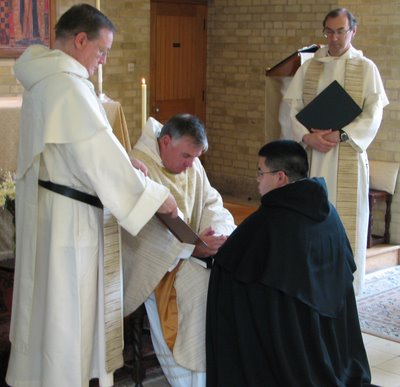 Above, I make Profession in the Order of Preachers for three years...
Above, I make Profession in the Order of Preachers for three years...Below, Fr Provincial blesses our scapulars
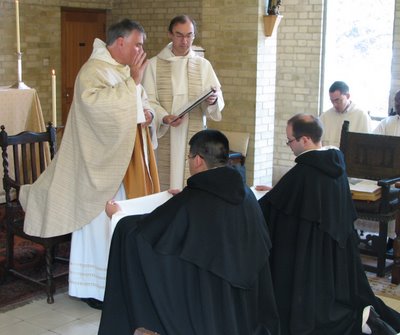 Below, Our Profession photo, taken a few weeks before the event at Thornham Parva church where the original 14th-century Domincan retable is housed:
Below, Our Profession photo, taken a few weeks before the event at Thornham Parva church where the original 14th-century Domincan retable is housed: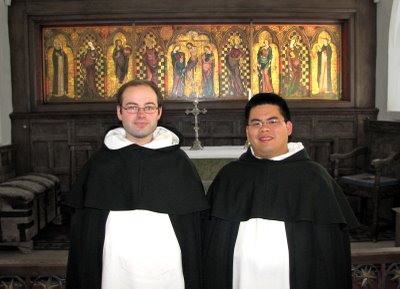
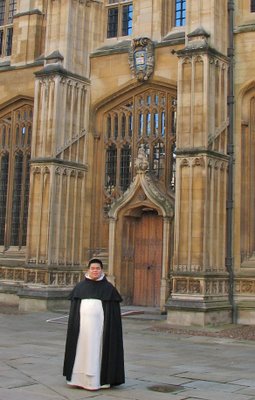
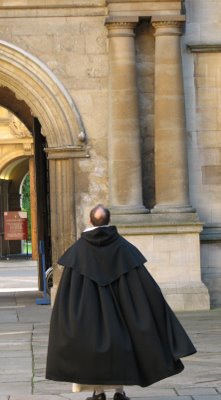
Br Paul and I (left and right) outside the marvellous Bodleian Library in Oxford... it was good that we got here 2 weeks before the start of term because now we spend more time labouring inside libraries than sight-seeing outside them!
See you all at 'Godzdogz'!
Sunday, June 18, 2006
A Retreat from Blogging...
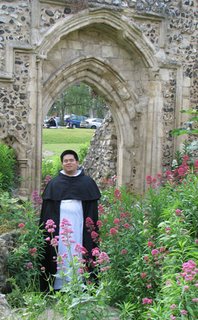
As I now enter the final stage of my Novitiate and (hopefully) prepare to make Simple Profession in September, it would be expedient for me to take a break from this blog. I ask my readers to pray for me and for my brother, Paul Mills in these months ahead as we hope to proceed towards making first vows on 20 September. I shall need to apply for an extension for my religious visa too and ask your additional prayers for this intention.
I hope to resume blogging again in October, quite possibly from Oxford by then... Those of my readers who wish to be informed when I resume posting to this site are requested to e-mail me with their address so as to be informed in due course.
I believe this retreat from blogging will be beneficial for me. As the Dominican mystic John Tauler said:
"There must be a definite introversion, a gathering up, an inward recollection of faculties without any dispersal, for in unity lies strength. So a marksman who wishes to hit his target more accurately shuts one eye to focus with greater precision... Moreover, should a going forth, an elevation beyond and above ourselves ever come about, then we must renounce our own will, desire and worldly activity, so that we can orient ourselves single-mindedly toward God, and meet Him only in complete abandonment of self..."
Until the next post, God bless and take care. Thank you all for reading and may we 'meet' again after the end of this 'fast' and retreat from blogging. In the interim, perhaps you may want to look at my posts from this time last year!
The photo above was taken in the environs of Norwich cathedral, last Friday.
Blackfriars' Corpus Christi Procession
 The Blessed Sacrament was taken under a canopy on procession around the garden. Above, bearing torches, are Sr Jordan James, OP and the Prior, Fr Richard Conrad, OP who served as deacon at the Mass.
The Blessed Sacrament was taken under a canopy on procession around the garden. Above, bearing torches, are Sr Jordan James, OP and the Prior, Fr Richard Conrad, OP who served as deacon at the Mass.Saturday, June 17, 2006
Woman of the Eucharist
 On this Saturday after (or before, in some countries) the Feast of Corpus Christi, let us contemplate this wonderful sacrament with Mary. As the words of this famous hymn puts it:
On this Saturday after (or before, in some countries) the Feast of Corpus Christi, let us contemplate this wonderful sacrament with Mary. As the words of this famous hymn puts it:"Ave verum Corpus, natum
De Maria Virgine,
Vere passum, immolatum
In cruce pro homine,
Cuius latus perforatum
Unda fluxit et sanguine,
Esto nobis praegustatum
In mortis examine."
'Hail, true Body,
Born of the Virgin Mary,
Truly suffered, sacrificed
On the Cross for mankind,
Whose pierced side
Flowed with water and blood,
Be for us a foretaste
In the trial of death.'
The Lord took His flesh and blood from the Blessed Virgin; they are intimately bound as only a mother and child can be and moreover, also as Saviour and Redeemed, she who was chosen to be Mother of God. In a sense, we too share that intimate bond between Jesus and Mary when we partake of the Eucharist, the Body and Blood of the Lord. Thus, Pope John Paul the Great in his encyclical, 'Ecclesia de Eucharistia' taught:
"In a certain sense Mary lived her Eucharistic faith even before the institution of the Eucharist, by the very fact that she offered her virginal womb for the Incarnation of God's Word. The Eucharist, while commemorating the passion and resurrection, is also in continuity with the incarnation. At the Annunciation Mary conceived the Son of God in the physical reality of his body and blood, thus anticipating within herself what to some degree happens sacramentally in every believer who receives, under the signs of bread and wine, the Lord's body and blood."
The icon above of Our Lady of the Eucharist, portrays the Mother of God in the orans position, the posture of prayer. Shown in this manner, Mary, the "Woman of the Eucharist" also stands for our Holy Mother, the Church, who prays and intercedes for the world. In the centre of the Church, at her heart, is the Lord who give us His Body and Blood in the Holy Eucharist. This great sacrament is the fons et culmens, the very "heart of the mystery of the Church", as Pope John Paul II said in his encyclical on the Eucharist. But this is heart is laid bare, open to all and the Lord gives Himself through Mary, through the Church to all people. As the Magnificat antiphon for Second Vespers of Corpus Christi puts it:
"O how sweet, O Lord, is thy spirit, who, to show thy tenderness to thy children, feedest them with thy sweetest bread from heaven, feeding the hungry with good things, and sending the disdainful rich away empty."
And so, together with Our Lady, let us give thanks and praise to God for the gift of His Son, for the gift of His Body and Blood in the Eucharist and sing her Magnificat. May we too share the Eucharistic faith of the Blessed Virgin Mary!
Of your charity, please pray for Christopher Angel, a friend of mine who is to be ordained to the priesthood today by Bishop Arthur Roche. Br Paul Mills and I shall be travelling to Bradford today for the celebration of this sacrament.
Friday, June 16, 2006
St Richard's Prayer
He went on to study at Oxford, Paris and Bologna and was captivated by the new Order of Friars Preachers. He studied theology with the Dominicans in Orleans and was ordained priest in 1242; thence he was recalled to Canterbury by the new Archbishop who had succeeded St Edmund of Abingdon, his great mentor and friend.
In 1244, Richard was consecrated bishop of Chichester and although he served for only eight years, he was noted for his effective care of souls, his zeal for reform and his love for the poor and sick, whom he served with exemplary holiness.
St Richard was canonized in 1262 by Pope Urban IV and on this day in 1276, his body was translated to a splendid shrine in Chichester Cathedral, which was to attract as many pilgrims as St Thomas of Canterbury's. As with that great English martyr, this holy bishop's shrine was despoiled by Henry VIII in 1538 and the bones of the saint were destroyed! A shrine in memory of him has since been established in the cathedral and one may visit it virtually here.
The beautiful Prayer of St Richard is one of my favourite and prayed in the aftermath of the wonderful Feast of Corpus Christi, it takes on a special resonance:
"Thanks be to you, my lord, Jesus Christ,
For all the benefits that you have given me;
For all the pains and insults you have borne for me.
O, most merciful redeemer, friend and brother,
May I know you more clearly;
Love you more dearly;
And follow you more nearly."
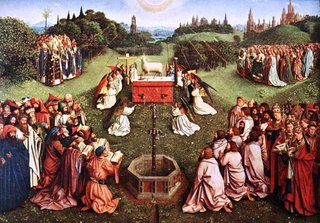 Like the famous antiphon written in honour of the Blessed Sacrament, the 'Ave Verum Corpus' and as St Thomas Aquinas also taught in the antiphon, 'O sacrum convivium', in the Holy Eucharist, Christ's "Passion is renewed"; the Eucharist is the Body of the One who "truly suffered, sacrificed on the Cross for mankind [and] whose pierced side flowed with water and Blood...". As such, when we receive the Eucharist and participate in the Holy Sacrifice of the Mass, we do well recall Christ's saving Passion and to render unto Him thanks and praise, as the first part of St Richard's prayer does.
Like the famous antiphon written in honour of the Blessed Sacrament, the 'Ave Verum Corpus' and as St Thomas Aquinas also taught in the antiphon, 'O sacrum convivium', in the Holy Eucharist, Christ's "Passion is renewed"; the Eucharist is the Body of the One who "truly suffered, sacrificed on the Cross for mankind [and] whose pierced side flowed with water and Blood...". As such, when we receive the Eucharist and participate in the Holy Sacrifice of the Mass, we do well recall Christ's saving Passion and to render unto Him thanks and praise, as the first part of St Richard's prayer does.By Christ's Paschal Mystery which is made present in the Mass, He has redeemed us and restored us to friendship with God and made us adopted sons of God, co-heirs with Him, our brother. This is succinctly expressed in the address of the second part of St Richard's prayer and from thence flows a series of requests which find their fulfillment in the Eucharist: By partaking of Christ's Body and Blood, we come to know Our Lord more clearly and to love Him more dearly and these enable us to walk with greater fidelity in the Way of the Lord. But we have also seen how the Corpus Christi Procession is a real enactment of walking with Christ; in the Eucharistic Procession, we actually can follow Him more nearly and He enters our world, our lives, our ways to transform and renew them.
This Blessed Sacrament is truly a great gift, uniting us with St Richard of Chichester and all the saints, and a foretaste and promise of that blessed feast when we shall be united with them at the Lamb's Supper.
Thursday, June 15, 2006
Corpus Christi at Blackfriars
(A Holy Day of Obligation)
Solemn Mass 7pm
followed by Corpus Christi Procession and Benediction
Reception afterwards in the Priory
Of the Blessed Sacrament of the Altar
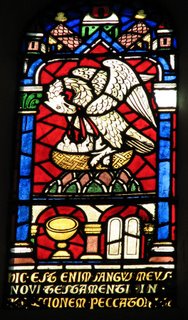 The English Jesuit, St Robert Southwell (1561-1595) was a poet of some note, who was martyred for the Faith at Tyburn. Unlike his family who capitulated to Anglicanism, St Robert Southwell maintained and professed the Faith of the apostles and saints and he wrote much of his poetry, which is radiant with this Faith, when he was imprisoned for it. It is believed that some of the saint's poetry was read by and influenced even William Shakespeare.
The English Jesuit, St Robert Southwell (1561-1595) was a poet of some note, who was martyred for the Faith at Tyburn. Unlike his family who capitulated to Anglicanism, St Robert Southwell maintained and professed the Faith of the apostles and saints and he wrote much of his poetry, which is radiant with this Faith, when he was imprisoned for it. It is believed that some of the saint's poetry was read by and influenced even William Shakespeare.Today, in celebration of Corpus Christi, this martyr's poem, below, in honour of the Blessed Sacrament expresses well our catholic and orthodox Faith. And it is fitting too that just as Christ continues to give His Body and Blood to us, so we recall the saints like St Robert Southwell who gave their lives for Christ's sake; we confess with them our common belief in this great Sacrament of unity.
The stained glass window, above right, of the 'Pelican in her piety' is a medieval symbolic expression of Christ feeding us with His life's Body and Blood; it is a symbol of the sacrificial love of which we partake in the Eucharist. This particular depiction is from the Round Church in Cambridge.
"The angels’ eyes, whom veils cannot deceive,
Might best disclose that best they do discern;
Men must with sound and silent faith receive
More than they can by sense or reason learn;
God’s power our proofs, His works our wit exceed,
The doer’s might is reason of His deed.
A body is endued with ghostly rights;
And Nature’s work from Nature’s law is free;
In heavenly sun lie hid eternal lights,
Lights clear and near, yet them no eye can see;
Dead forms a never-dying life do shroud;
A boundless sea lies in a little cloud.
The God of Hosts in slender host doth dwell,
Yea, God and man with all to either due,
That God that rules the heavens and rifled hell,
That man whose death did us to life renew:
That God and man that is the angels’ bliss,
In form of bread and wine our nurture is.
Whole may His body be in smallest bread,
Whole in the whole, yea whole in every crumb;
With which be one or be ten thousand fed,
All to each one, to all but one doth come;
And though each one as much as all receive,
Not one too much, nor all too little have.
One soul in man is all in every part;
One face at once in many mirrors shines;
One fearful noise doth make a thousand start;
One eye at once of countless things defines;
If proofs of one in many Nature frame,
God may in stranger sort perform the same.
God present is at once in every place,
Yet God in every place is ever one;
So may there be by gifts of ghostly grace,
One man in many rooms, yet filling none;
Since angels may effects of bodies shew,
God angels’ gifts on bodies may bestow.
What God as author made he alter may,
No change so hard as making all of naught;
If Adam framed was of slimy clay,
Bread may to Christ's most sacred flesh be wrought.
He may do this that made with mighty hand
Of water wine, a snake of Moses' wand."
- from 'Of the Blessed Sacrament of the Altar'
"Zion, to Thy Saviour sing, to Thy Shepherd and Thy King! Let the air with praises ring!... Let us form a joyful chorus, may our lauds ascend sonorous, bursting from each loving breast."
Wednesday, June 14, 2006
BBC's 'The Convent'
Thanks to the BBC, one can now view the entire episode online. If you missed the program, do visit the site and watch it and share it with others! It's well worth the effort! Sadly, I'm told that one can view the program online from outside the UK, so those who live elsewhere have to wait for it to air!
AMENDED ON 15/06 at 23:18
Bread for the Way
 The Holy Eucharist is Viaticum, Bread for the Way. Some of us may be familiar with Tolkien's interpretation of this phrase, as expressed in the 'Lembas', or 'Waybread' which the elves give to the Fellowship of the Ring: this Bread is more strengthening than any other food known to mankind, it is offensive to evil creatures and the more one relies on it alone, the more powerful its effect on the one who consumes it. In Tolkien's words, "It fed the will, and it gave strength to endure and to master sinew and limb beyond the measure of mortal kind" and he came to acknowledge this link between Lembas and the Eucharist himself in one of his letters.
The Holy Eucharist is Viaticum, Bread for the Way. Some of us may be familiar with Tolkien's interpretation of this phrase, as expressed in the 'Lembas', or 'Waybread' which the elves give to the Fellowship of the Ring: this Bread is more strengthening than any other food known to mankind, it is offensive to evil creatures and the more one relies on it alone, the more powerful its effect on the one who consumes it. In Tolkien's words, "It fed the will, and it gave strength to endure and to master sinew and limb beyond the measure of mortal kind" and he came to acknowledge this link between Lembas and the Eucharist himself in one of his letters.On the Feast of Corpus Christi, we take the Sacred Host in Procession, so that this signification of the Eucharist as Viaticum is made shown forth; we journey together with the Lord and in His grace and strength, walking along His Way. The Holy Father in his 'Meditation for the Feast of Corpus Christi' which we have been following has already expressed this idea and he explains the full implications of this Procession. In the extract below, which concludes his meditation, we are invited to follow the example of St Peter and his successors, to continue to follow Christ and walk in His Way, with the Eucharist as our 'Waybread' that gives us strength for true discipleship and for building God's kingdom:
"In the Eucharist, God's tomorrow comes closer to us, so that his kingdom begins even today among us. And last but not least, let us not forget that all the petitions of the Our Father are in the plural form. No one can say 'my Father' except Jesus alone. We all can only say 'our Father' and therefore must always pray with others and for others, going out of ourselves, opening ourselves, and only by becoming open in this way do we pray correctly at all. All of this is expressed in the fact of being on the way with the Lord, which is, so to speak, the special sign of the Feast of Corpus Christi.When our Lord had finished his eucharistic discourse in the synagogue of Capernaum, many of his disciples went away. All of that was too hard for them, too mysterious. They just wanted a political solution; all the rest was not pragmatic enough for them. Is that not the case today as well? How many people, over the course of the last hundred years, went away because Jesus was not practical enough for them? And we see what they accomplished then. If the Lord asks us here, today, 'Will you also go away?' then we should answer him with our whole heart, together with Simon Peter on this Feast of Corpus Christi: 'Lord, to whom shall we go? You have the words of eternal life; and we have believed, and have come to know, that you are the Holy One of God' (Jn 6:67-69). Amen."
The painting above is from the refectory of the Dominican convent at the Penya de Francia Marian shrine in Spain.






